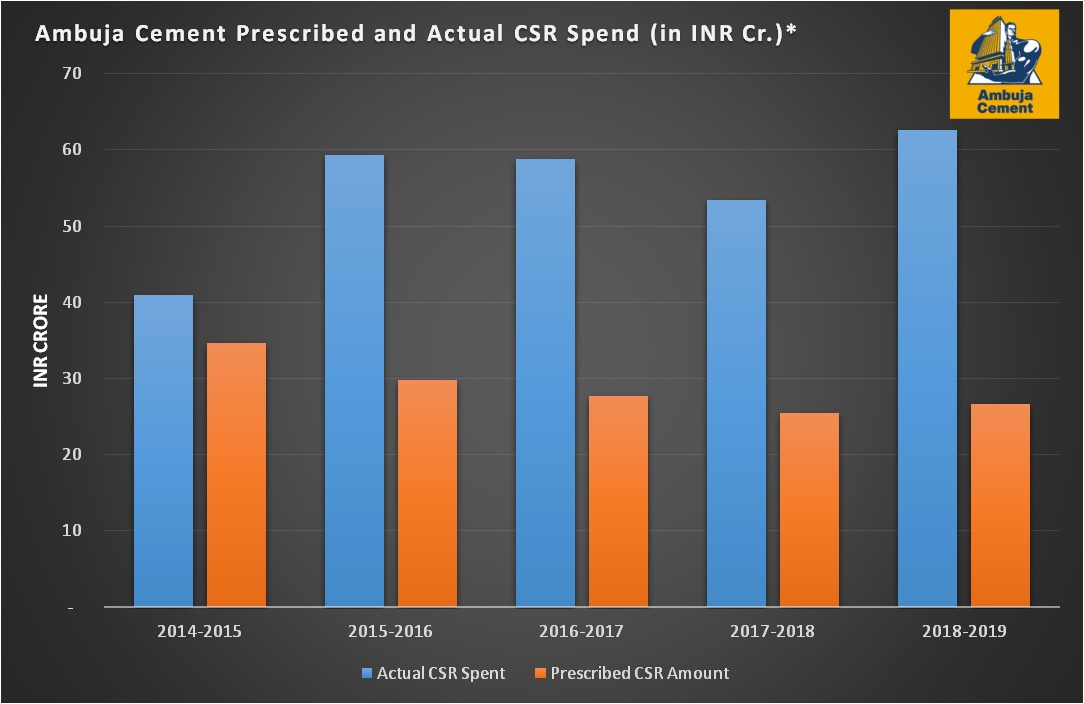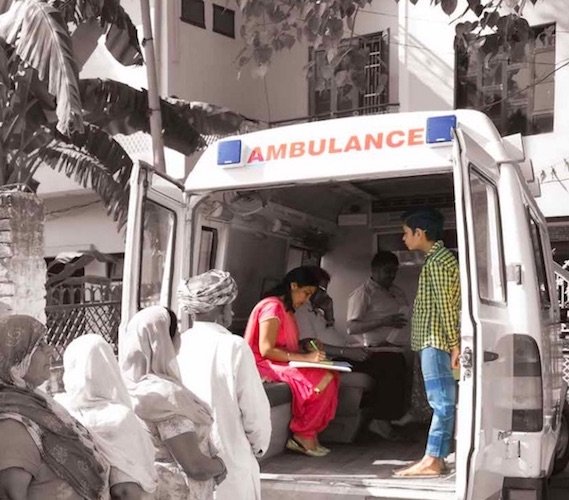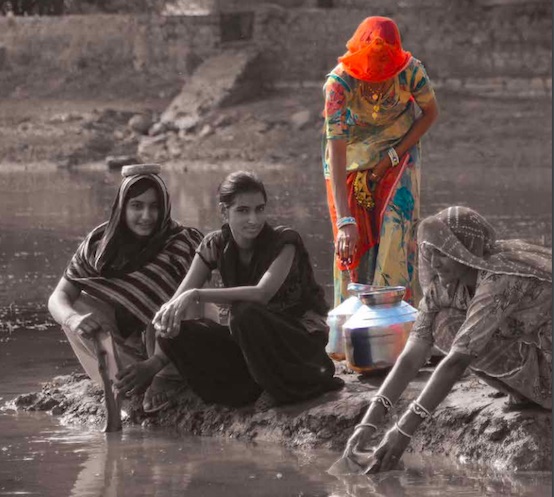Since its inception, Ambuja Cement has made India proud by making India self-sufficient in meeting her infrastructural needs. The company which is one of the most well-run companies in India has equally focussed on developing the community around which it operates. Corporate Social Responsibility initiatives of Ambuja Cement reach out to 2.7 million people across 44 locations in 11 states of India.
Ambuja Cement addresses some of India’s most important development challenges in the areas of water resource management, livelihood promotion, social development, women empowerment and infrastructure development. The Companies Act 2013 which made Corporate Social Responsibility mandatory did not make a huge difference in the funds allocated by Ambuja Cement towards CSR as the company has been working extensively to bring about social development since 1993. In the last FY 2020-21, the company spent Rs. 53.97 Crores on their CSR initiatives.
The CSR Journal in its #LetsTalkCSR series is evaluating the CSR initiatives of Ambuja Cement in this detailed report.
The below video highlights the various CSR activities of the Ambuja Cement Foundation.
Ambuja CSR Spends

1. Ambuja Cement Foundation – The CSR arm of Ambuja
Ambuja carries out its CSR activities in India through the Ambuja Cement Foundation(ACF). Ambuja Cement Foundation was established in 1993 to bring about a change in the social development around its operations. ACF works exclusively with rural communities on issues related to Water Resource Management, Agro & skill-based livelihood generation, health, education, women’s empowerment and rural infrastructure.
The Ambuja Cement Foundation is the Corporate Social Responsibility arm of Ambuja Cements Ltd. which works with the communities surrounding Ambuja’s manufacturing sites and envisages bringing about a positive change in their lives. The Foundation is engaged in a variety of people-centric, integrated rural development projects. Since its inception, the Foundation has expanded its reach and diversified its programmes to include as many members of its stakeholder group as possible. While working with the participation of the people, ACF has held its mission statement central to all its operations. The Foundation has a presence in twelve states across the country and is engaged in programmes like Natural Resource Management, Agro-based and skill-based livelihoods and improvement of health status, educational support and economic enhancement.
2. CSR Policy
Ambuja CSR Policy intends to:
– To lay down guidelines to make CSR a key business process for sustainable development of the society.
– To directly/indirectly undertake projects/programs which will enhance the quality of life and economic well-being of the communities in and around our plant and society at large.
– To generate goodwill and recognition among all stakeholders of the company.
2.1. CSR Committee
The Company has constituted a CSR and Sustainability Committee as required under Section 135 of the Companies Act, 2013. The Company is at the forefront of undertaking various CSR activities in the fields of Health and Sanitation, Skill Development, Agriculture, Water Resource Management and Women Empowerment which has tremendously benefitted the communities around its operations. Sustainability has been embedded in the Company’s Vision statement and is a major thrust area for carrying its activities in the most sustainable manner. The major Sustainability areas include Health and Safety, Environment, Alternative Fuels and Raw Materials (AFR), Waste Management, Renewable Energy, Sustainable Construction Practices etc.
The Company has also formulated “CSR Policy”, “Sustainability Policy”, “CSR and Sustainability Charter” and also publishes its Annual Corporate Sustainable Development Report (GRI G4 compliant A+) which is available on the Company’s website. The members of the committee are as follows:
1) Mr N. S. Sekhsaria (Chairman)
2) Mr Nasser Munjee
3) Mr Martin Kriegner
4) Mr Rajendra P Chitale
5) Mr Mahendra Kumar Sharma
6) Mr Neeraj Akhoury
7) Ms Pearl Tiwari
The CSR committee performs the following functions:
a) frame the CSR Policy and its review from time-to-time.
b) ensure effective implementation and monitoring of the CSR activities as per the approved policy, plans and budget.
c) ensure compliance with the laws, rules and regulations governing the CSR and to periodically report to the Board of Directors.
d) review and monitor Sustainability initiatives and its performance and such other related aspects.
2.2. CSR Team
Pearl Tiwari is a Director, and the CEO of Ambuja Cement Foundation and the President of the CSR & Sustainability division at Ambuja Cements Limited. She has more than 35 years of experience in the social development sector and is known for her focus and know-how in community development.
The board of Ambuja Cement Foundation comprises stalwarts from the industry who are known for their top-notch management skills and use them to bring about a positive change in the community. The bord of the Ambuja Cement Foundation includes Mr Sharadchandra Kale, Mr P K Laheri, Mr C S Rajan, Ms Ashni Biyani, Mr Vijay Kumar Sharma, Ms Padmini Somani (Founder-Director of the Salaam Bombay Foundation), Mr B L Taparia and Mr Neeraj Akhoury.
The Leadership Team includes people who have varied experience across all social sectors. The following are the members of the ACF CSR leadership team:
a) Mr Chandrakant Kumbhani – GM, Community Development
b) Mr Ravi Nayse – GM, Skill Development
c) Ms Anagha Mahajani – GM, Program Research & Monitoring
d) Mr Manoj Agarwal – DGM, North & East
3. CSR Strategy
Ambuja CSR initiatives strive for development that positively impacts society and brings about a lasting change in the life of the community. The CSR projects take responsibility for the Company’s actions and encourage a positive impact through its activities on hunger, poverty, malnutrition, environment, communities, stakeholders and society.
4. Healthcare
Ambuja Cement Foundation strongly believes that Indian Healthcare requires critical investment and support by the private sector to ensure that that it matches global standards.
4.1. Tackling HIV/AIDS among Truck Drivers
The trucking community is notorious for being carriers of HIV/AIDS. The Dhulagarh Truck Terminal in Sankrail, on the outskirts of Kolkata, is a major transport hub with approximately 6000 trucks halt there every day so that truckers can park their lorry, await entry into the city at night, drop off and pick up a new load and continue the routine. The truck drivers work in tough conditions with unusually long working hours and also stay away from their family for months. The difficult road and driving conditions and the long working hours take a toll on the physical and mental health and wellbeing of truckers and many of them access Commercial Sex Workers with a small percentage of the truckers using condoms. This has led to a high prevalence of HIV/AIDS in the trucking community.

ACF in partnership with Apollo Tyres Foundation initiated the establishment of a Health Care Centre under a Public-Private Partnership (PPP) model. It was established in 2009 at the Dhulagarh Truck Terminal and provides a range of health care services such as the prevention, identification and treatment of HIV/ AIDS along with other sexually transmitted infections. The centre also provides health services related to vision care, creates awareness on tuberculosis and other non-communicable diseases including diabetes and high blood pressure which has a high incidence among the driving population.
The majority of health concerns that affect truckers requires behaviour and lifestyle changes and hence the program focusses on using innovative ways to deliver the message. They conduct puppet shows and hold information stalls to create awareness among truckers to teach them better ways to protect and manage their health.
The footfall in the Clinic increased from 2704 in 2009-10 to 6262 in 2018-19. Additionally, the percentage of sexually transmitted patients against footfall decreased from 30.47% to 2.85% – largely thanks to the sale of condoms which has increased from 7814 in 2009-10 to 30,500 in 2018- 19. With such success, ACF and Apollo Tyres Foundation decided to take the programme to other key locations where a high volume of truckers are prevalent. The programme expanded to other locations like Surat, Farakka and Nalagarh where trucks converge on Truck Terminals. In each of these places, you see a sea of trucks parked. And close by are thousands of truckers sipping chai – a sea of happy, smiling, healthy faces! The truck drivers are an important stakeholder in the heavy industry and Ambuja Cement Foundation wants to continue bringing a positive change in the life of the truckers.
4.2. Other Health Initiatives
Ambuja Cement believes that Corporates have an important role to play in providing value-addition to optimise Health & Wellness Clinics at a grassroots level. This could be via supporting the development of core infrastructure, the introduction of telemedicine to connect with tertiary care hospitals for specialised services, and strengthening the skill sets of health workers, paramedics and doctors. And hence the company through its CSR projects makes various interventions in the healthcare system especially in the rural areas where access to quality healthcare is a major issue and also comes at a hefty price.

Malnutrition is major issues faces by people in India and hence ACF, in partnership with the Integrated Child Development Scheme Departments (ICDS), initiated a baseline study and has proposed interventions to strengthen the resources of Anganwadi centres, develop capacities of Integrated Child Development Scheme Department (ICDS) staff and ensure participation of village-level institutions. ACF has initiated malnutrition interventions across 30 Anganwadi Centers of Dadri (Uttar Pradesh), covering 5 villages and aims to create awareness which will lead to a domino effect and bring about a change in other villages in the district.
The youth is plagued by Non-Communicable Diseases (NCDs) which have a 62% mortality rate. The majority of NCDs are lifestyle-related and can be prevented via education and awareness. ACF expanded its reach in NCD intervention by adding two new locations in Punjab and Uttarkhand – spreading awareness in an extra 20 villages, 9,270 households and 52,709 individuals. ACF collaborates with the Government to conduct NCD programmes focused on Community Based Assessment Checklist (CBAC) to identify at-risk populations and provide referrals for diagnosis and treatment. This awareness helps curb the burden of NCDs in future generations.
The prevailing sanitation standards in India are a major cause of concern leading to many diseases. ACF, in collaboration with communities, community-based organizations, Self-Help Groups and Federations has achieved 100% toilet coverage in 146 out of 227 villages and the rest with 80% coverage. Sanitation drives were conducted in 227 villages to ensure a toilet in every household.
5. Education
5.1. Ambuja Manovikas Kendra
A whopping 26.8 million people in India are specially-abled individuals. Only 1% of the 12 million differently-abled children attend school and more than 60% of the people who are differently-abled are unemployed. This is a vicious cycle and hence Ambuja Cement CSR founded the Ambuja Manovikas Kendra to change the situation at the grassroots level. They envisage to improve the quality of life of differently-abled children and teach them skills so they can be independent in their day to day activities and they have been pretty successful at that.
Children between the age of 0-6 years with delayed development/mental retardation receive early identification and assessment. Special programs are developed to bring about behaviour modification and guidance for medical intervention. A therapeutic Centre has also been established to provide regular Physiotherapy to tackle issues such as poor balance, weak gross and finer motor skills. These centres also provide Speech and Occupational Therapy.
4 athletes from the Punjab Floor Hockey team won a Gold Medal at the National Championships. AMK won the overall championship trophy in the 21st Punjab State Special Olympics games, and Ms Ramandeep Kaur (Senior) was a member of the Indian Unified Female Football team that participated in the World Cup held in Chicago.

5.2. Value Addition in Government Schools
India has a huge network of government schools which provide free basic education to its large young population. ACF CSR provides a number of interventions to help value-add government schools in the communities in which they work. With Ambuja’s focus on infrastructure and quality education, the programme works in collaboration with the Government, School Staff and SMCs to enhance learning outcomes and environments for students.
The government schools find it very difficult to find English speaking teachers and hence the students even after passing from school find it difficult to converse even in basic English. Ambuja as a part of its CSR projects in Chandrapur organised an English Language Training Programme for school teachers as part of a pilot programme, focusing on the programme in the areas of speaking, reading and writing. They tested the abilities of students of 10 schools in Chandrapur, and found that they lacked reading skills, struggled with spellings and had very less vocabulary. After the success of this pilot programme, ACF plans to expand
6. Rural Development
A nation’s economic growth is backed by robust infrastructure and India lags behind the world when it comes to this metric. The situation becomes dire when considering rural areas of India. The infrastructure in rural villages across India is sub-standard and does not adequately support villagers in agriculture, business, connectivity, social cohesion or the upliftment from poverty.
Community Infrastructure is necessary to support villagers in their day to day lives. ACF provides facilities such as community halls, common washing areas and boundary walls is necessary to protect spaces. 20 Community halls were renovated or newly constructed across 7 locations in the last financial year. 22 schools and 3 ICDS centres were repaired and 4 new schools were constructed during the year. ACF helped communities construct boundary walls for common places like schools, across 9 villages and ACF also constructed 10 new washing platforms in Bhatapara and Darlaghat.
Ambuja Cement Foundation through its CSR initiatives invests in rural infrastructure in its core villages, to improve access to market centres, enhance schools and make various aspects of day to day life easier for the people who live there. Infrastructure is a hygiene factor when it comes to development and Ambuja Cement wants to play a starring role in providing it to the community around which the company has its operations.
Over the last financial year, Ambuja Cement constructed 92 km of roads, built 30 schools, laid 37 km of water distribution pipeline, ensured 100% toilet coverage in 146 villages and developed 284 community places.
7. Sustainable Operations
Ambuja Cements ranks 4th globally in the Construction Material Category adjudged by the world-renowned Dow Jones Sustainability Index – 2019. It is the highest-ranked construction materials company from India showing how focussed the company is on operating sustainably and giving back more to the society than it takes from it.
7.1 Water Conservation
Producing Cement consumes a lot of natural resources and the industry is notorious for its discriminatory use of water, energy and land. Ambuja Cement wanted to be different and has striven to embed environmental and social considerations in business decisions since its inception.


